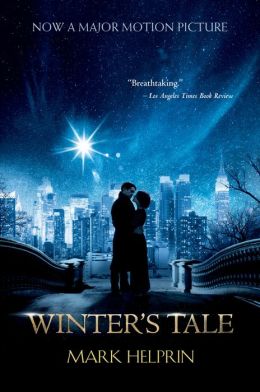Mark Helprin’s Winter’s Tale is a notable literary achievement that hit the New York Times best-seller list in 1983, the year it was published. The movie hit theaters February this year. Since I hadn’t read the book, I thought I’d see the movie, but it got horrible reviews on Rotten Tomatoes. Meanwhile, a friend casually claimed Winter’s Tale as her favorite book. I’d never until that moment heard her make a statement like that about any book, and so the comment hung with me, urging me to consider reading Helprin’s novel; however, it’s a big deal for me to commit to reading a voluminous, long-ago published book, when I need to keep up with reading new publications. But then I saw the movie tie-in edition of the novel and, ever a romantic, that pushed me over the edge into reading this thicker-than-a-bread-loaf book that’s north of 700 pages.

Let me say right away that the illustration of the movie tie-in falsely gives the impression Winter’s Tale is a love story. It’s not that at all. The illustration showcases merely the beginning, when the Irish burglar and master mechanic Peter Lake breaks into the Manhattan mansion of newspaper publisher Isaac Penn and falls in love with his daughter, Beverly, who’s dying of consumption. Their union ignites the story’s enchanted mood, but it is not the Full Monty of Helprin’s magical fantasy that spans the late 19th century to the end of the 20th century, predominantly in New York City. Suffice it to say, Winter’s Tale comprises several plot lines, and it became the most perfect book for me to read during Lent, leading up to this Easter week of resurrection, because while it is a complex story about many things, at its heart, Winter’s Tale is about defying time and death.
Peter Lake is the central, saving hero in this engrossing story whose ageless reappearance, 85 years after he vanishes into a field of clouds, signals victory over clock-bound time. Other principal characters include Hardesty Marratta, a California man who rejects a phenomenal inheritance to seek “the just city”; Virginia Gamely (who marries Hardesty) and her verbally acrobatic mother Mrs. Gamely, both from the mystical Lake of the Coheeries, where inhabitants live through the cruelest winters; Harry Penn, who takes over his father’s newspaper business; and his managing editor Praeger de Pinto, who becomes a New York City mayor.

These and others have large and small roles in a masterfully planned staging of a mythic New York City; however, the story’s expansive, otherworldly reach extends beyond their roles into a realm of higher forces at work in this life. I can’t imagine any movie coming close to capturing the profound messaging about time, justice, balance, suffering, humility and ultimate purpose. There’s no easy way I could even capture it here. To that point, consider another principal character, Athansor, a magnificent white horse that symbolizes forbearance and triumph. His leaps are so powerful he flies, many times removing Peter Lake from the dangerous, criminal mitts of Pearly Soames, who’s ever after destroying the man who seeks truth. Athansor’s breathtaking presence on the page creates a kind of wonder and hope that’s hard to quantify.
And so I join the many others through the years who’ve read and claimed Winter’s Tale as an extraordinary book. It proved more than worthy of the time away from new releases, consuming me with its sumptuous narrative and embedded wisdom, which includes this comment made by Mrs. Gamely to her daughter Virginia:
“No one ever said that you would live to see the repercussions of everything you do, or that you have guarantees or that you are not obliged to wander in the dark, or that everything will be proved to you and neatly verified like something in science. Nothing is: at least nothing that is worthwhile. I didn’t bring you up only to move across sure ground. I didn’t teach you to think that everything must be within our control or understanding. Did I? For, if I did, I was wrong. If you won’t take a chance, then the powers you refuse because you cannot explain them, will, as they say, make a monkey out of you.”

I’m so glad you enjoyed this — and shared your delight! I have loved this book since it came out but could never fully articulate that joy. After having read Pete Hamill’s “Forever” — and with 30 years of “seasoning” in me — I think it’s time I re-read “Winter’s Tale.” I suspect it will be magical in a whole different way. (And no, I didn’t see the movie. After being crushed by how film makers ruined “The Dark Is Rising” by Susan Cooper, I couldn’t take the risk!). Well done, Kassie!
LikeLike
Thanks Laralyn!
“Winter’s Tale” would be a book I take with me to the proverbial desert island because I could re-read it many times, which is to say, go for the re-read. I agree it likely will be magical in a whole different way!
LikeLike